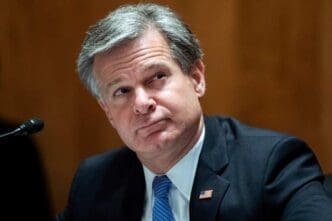In a move that has stirred significant debate, President-elect Donald Trump declared his intention to nominate Kash Patel as the next FBI director. This announcement heralds a potential upheaval at the national law enforcement agency, tasked with safeguarding the country and investigating federal crimes.
Kash Patel, a loyal supporter of Trump, is known for his contrasting approach compared to current FBI Director Christopher Wray. Patel advocates for significant changes within the agency, diverging from Wray’s steady and calm approach to leadership. This nomination follows Trump’s pattern of appointing controversial figures, challenging the Senate to confirm his candidates amidst various opinions.
Christopher Wray, appointed by Trump in 2017, has three years left on his tenure. Traditionally, FBI directors have been allowed to fulfill their terms, maintaining independence from political sway. However, Wray’s continuity is uncertain as Trump signifies a shift in leadership preference.
The prospect of Patel’s confirmation by the Senate remains uncertain despite Republican control. His plans to rework the FBI and his claims of government conspiracies against Trump could face significant scrutiny during hearings. Additionally, Patel’s proposal to close the FBI’s central headquarters and reposition staff across the nation could raise concerns among legislators who view the FBI as needing impartiality from political influence.
Senator Chris Coons, reflecting on the situation, mentioned on social media that Patel’s capabilities and intentions would be rigorously evaluated by the Senate Judiciary Committee. The nomination is seen as a critical test of the Senate’s advisory role.
Trump’s mention of possible recess appointments adds another layer of complexity to the confirmation process. However, many of Patel’s ambitions would require broad administrative support and could likely encounter institutional resistance.
Patel’s assertive agenda, including reducing the FBI’s reach and authority, proposes a departure from previous bureau chiefs who typically sought increased resources. His focus on removing alleged conspirators and confronting media figures is linked to a broader desire to address perceived injustices against Trump’s presidency. Still, this approach may conflict with established guidelines, emphasizing fact-based investigations rather than politically motivated pursuits.
Furthermore, Patel’s intentions to overhaul established policies on media-related investigations signal a desire to revisit Justice Department protocols, particularly concerning the protection of journalists’ records during leak probes. Nevertheless, these proposals would need thorough vetting and consensus across various governmental agencies to be realized.
Kash Patel’s nomination as FBI director by President-elect Donald Trump signifies a challenging road ahead, possibly reshaping federal law enforcement dynamics. Patel’s vision of transforming the FBI faces both political hurdles and administrative obstacles, emphasizing the ongoing discourse on the agency’s future and its independence from political agendas.
Source: News4jax








